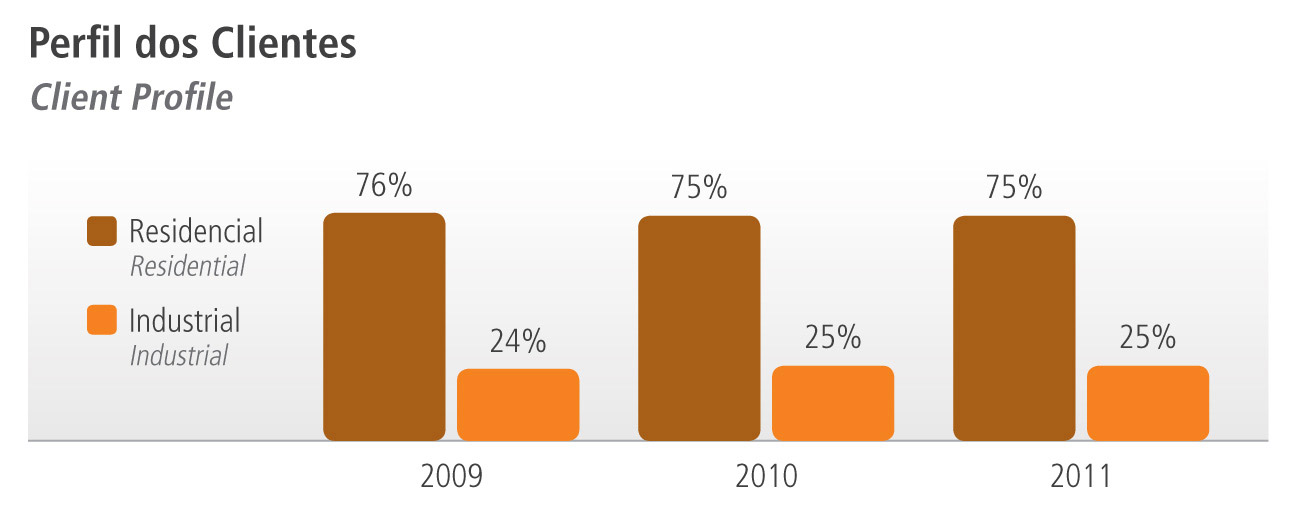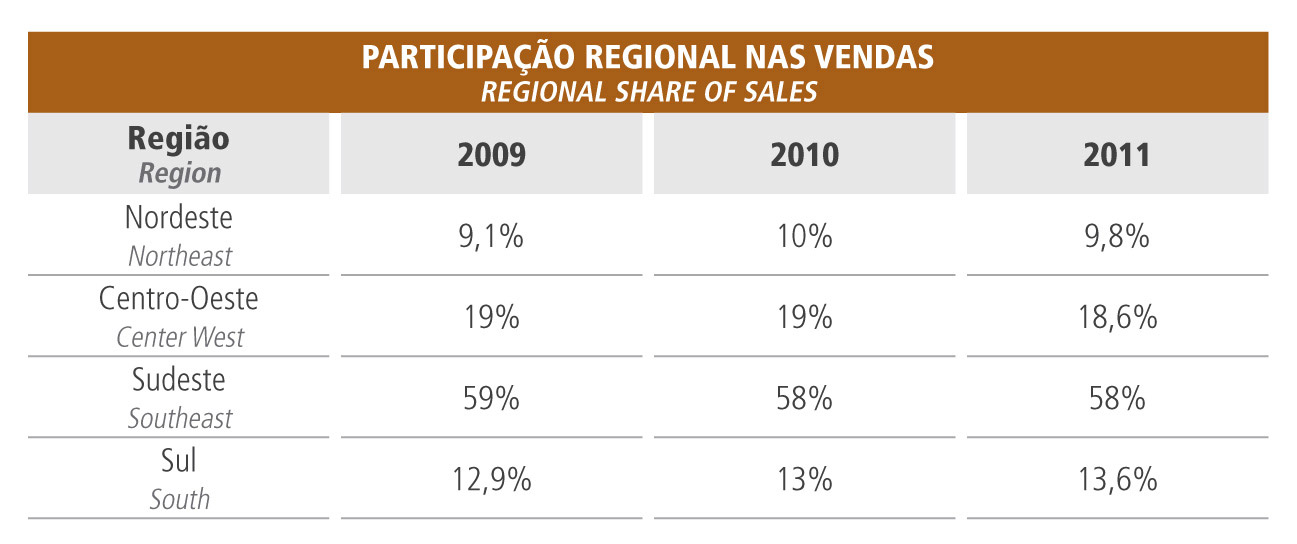Leading LPG Bottling and Distribution Company in Brazil
Copagaz Distribuidora de Gás S/A is a private Brazilian company that operates in the LPG bottling and distribution sector. It’s the fifth largest company in this industry in Brazil, according to the National Syndicate of LPG Distributors (Sindigás), with a 55-year track record of growth and success.
Profile
History
Copagaz Distribuidora de Gás S/A is a private Brazilian company that operates in the LPG bottling and distribution sector. We are proud to be the fifth largest company in this industry in Brazil, according to the National Syndicate of LPG Distributors (Sindigás), with a 55-year track record of growth and success. Founded by its current President, Ueze Elias Zahran, Copagaz has decades of solid business behind it, in addition to excellence in the commercialization of its products and in serving the needs of its diverse constituencies. Aware of its role and its power of economic, social and environmental transformation, the company is always seeking ways to move its business forward with ethics and sustainability.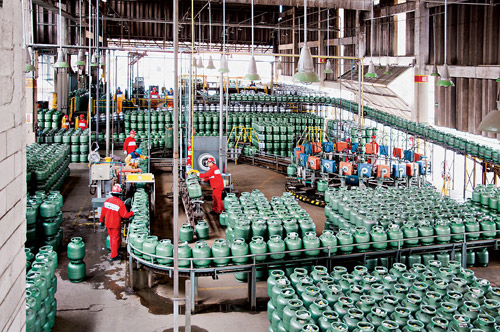
Mission
“To bottle and distribute LPG, to satisfy the energy needs of a growing number of people and companies, with quality and at a fair price. To respect the environment, be fair to our partners, create satisfaction among our staff members, strive for the profitability and growth expected by our shareholders, and support our distribution network in such a way that end users of LPG are ensured of being supplied with convenience, practicality, safety and speed.”
Vision
“To be recognized as a company that is concerned about the needs of its customers and the excellence of its service as a model of administrative efficiency, ethical conduct and social responsibility, as a worthwhile investment, and as the best place for its staff members to develop professionally.”
Values
-
Satisfaction and safety of the consumer;
-
Ethical conduct and respect in relations with competitors and partners;
-
Developing the value of staff members: recognition, opportunities and professional growth;
-
Compliance with the laws in force;
-
Social and environmental responsibility: respect for neighbouring communities, implementation of socio-cultural projects, respect for the environment.
Operational Structure
Copagaz Distribuidora de Gás S/A
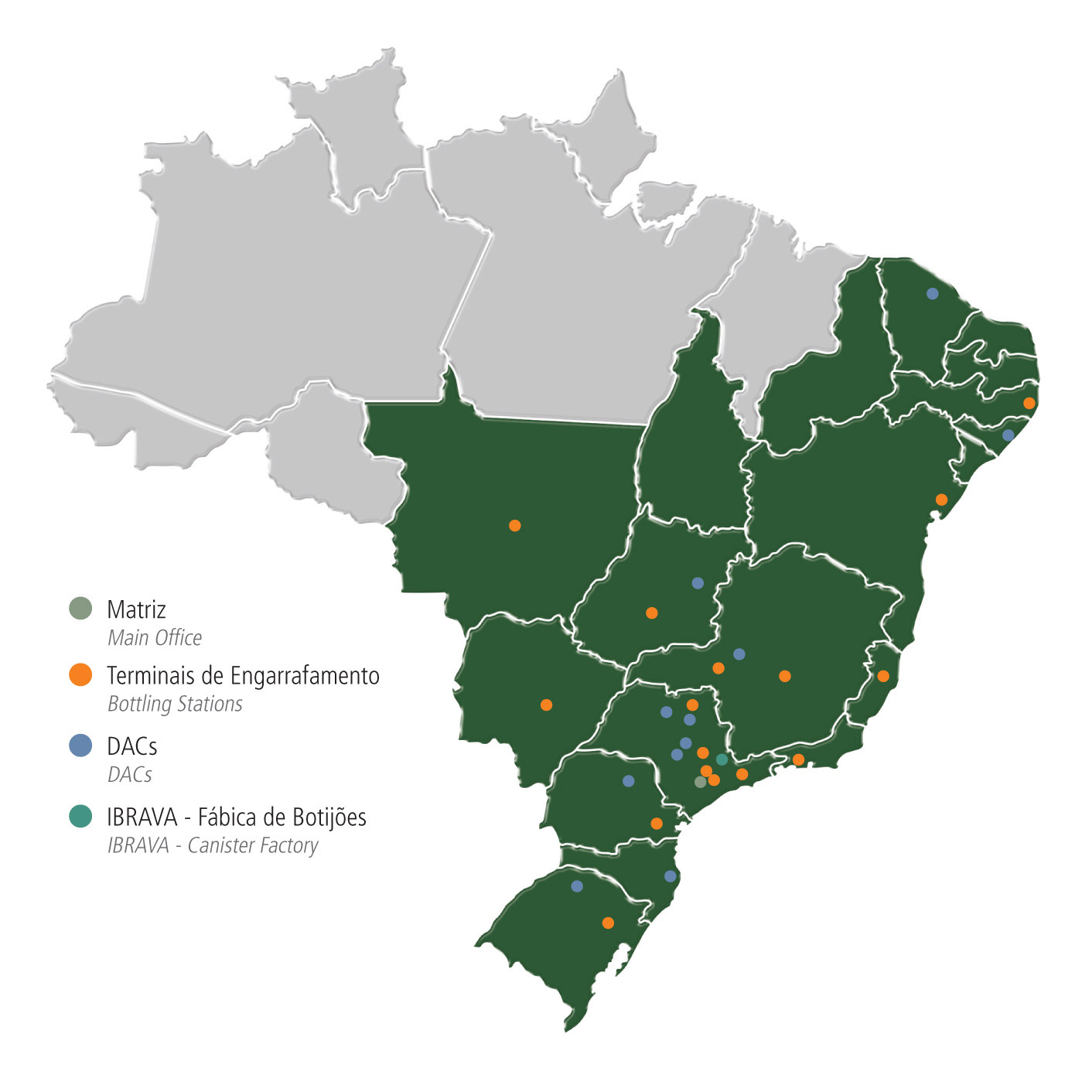
With its headquarters in the city of Sao Paulo, capital of the state of Sao Paulo, Copagaz is present in 18 Brazilian states as well as the Federal District, serving residential and industrial clients. The company directly employs 1,604 employees and operates in more than 1,255 municipalities. Senior management and directors are only present at the main office.
Copagaz operating units break down as follows:
-
13 Bottling Terminals: commercial operating units engaged in the storage, bottling and distribution of LPG for dealers and industrial, commercial, rural and public clients as well as large residential buildings;
-
11 Advance Copagaz Depots (DACs): units for stocking of LPG in canisters for resupply of the closest dealers. This structure reduces freight costs, vehicular emissions and delivery time, optimizing the logistics of product distribution, with the DAC of Ibirité project to become a Bottling Terminal currently under way (it is still considered a DAC);
-
1 Canister factory: the Indústria Brasileira de Vasilhame (Ibrava) operating unit inaugurated in 2010 forming part of the structure of Copagaz, allowing the company to engage in all phases of LPG commercialization;
-
1 Dealership;
-
1 Maintenance Workshop.
Flow of Distribution
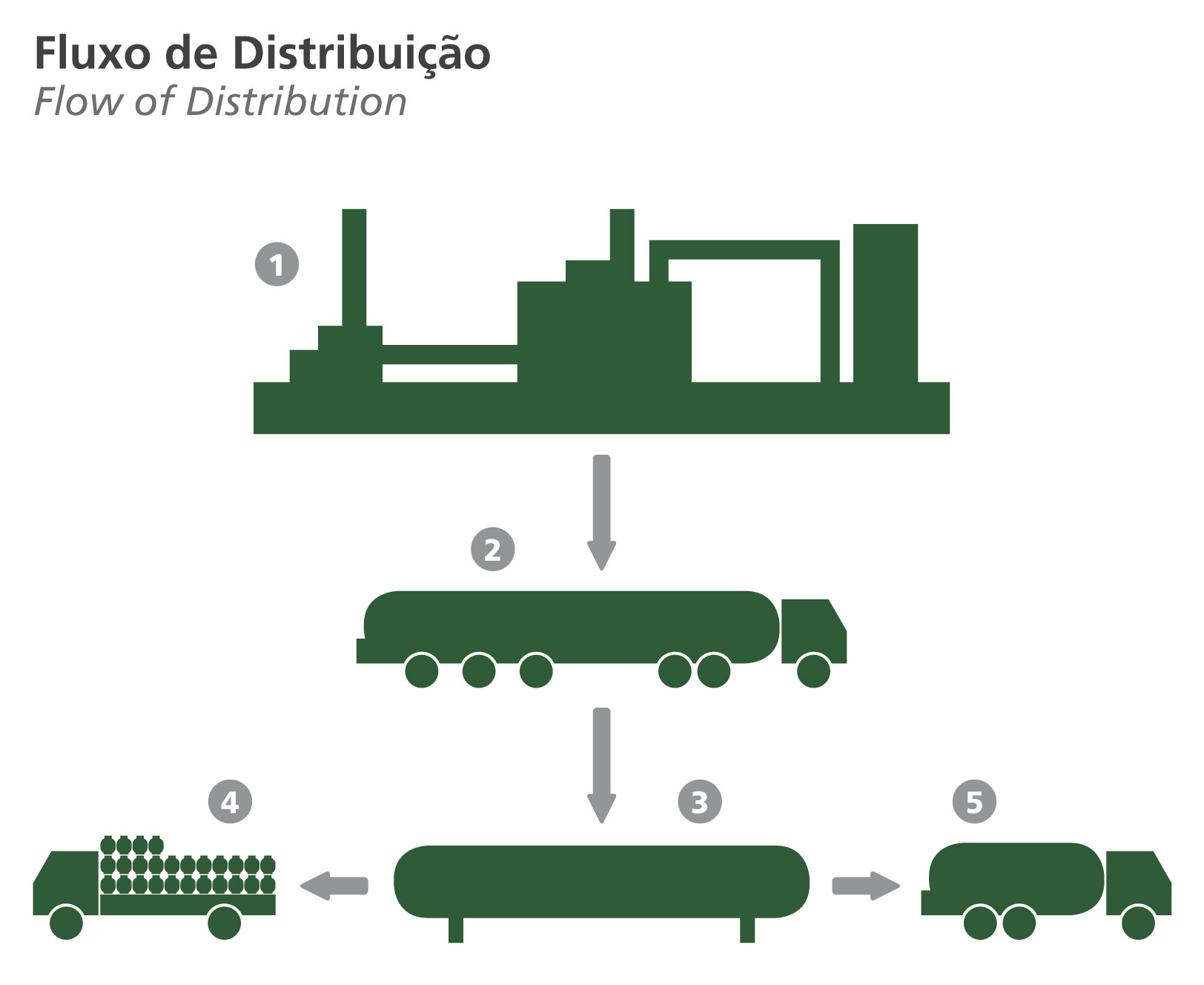
1. LPG is produced by refineries, from the refinement of crude petroleum or natural gas;
-
2. From the refineries, the LPG arrives at Copagaz via pipelines or tanker-trucks;
-
3. At Copagaz operating units, the LPG is stored in large pressure vessels, from which it is transferred in a liquid state to the bottling process in transportable receptacles of various kinds (2 to 13 kg canisters and 20 to 90 kg cylinders) or for bulk distribution, via Bob-Tail trucks;
-
4. Delivery to residential clients is carried out by dealers, business partners working in retail, who acquire the canisters and make them available for sale to end-consumers;
-
5. Service for industrial clients, large buildings, small and medium-sized businesses and agricultural enterprises is carried out by Bob-Tail trucks or autotankers, which refill the portable and stationary receptacles installed at clients’ facilities.
Corporate Governance
Corporate Governance and Transparency
Transparency, accountability and corporate responsibility are good governance practices that Copagaz is adopting in all of its spheres of activity, with the aim of strengthening its own strategic management. In this way, the company is voluntarily following the recommendations of the Brazilian Institute of Corporate Governance (IBGC).
To guarantee these practices and ensure the company’s alignment with the interests of its various constituencies, Copagaz management is built upon three main committees: the Administrative-Financial Committee, the Ethics and Conduct Committee, and the Business Sustainability Committee. This work is of great importance, and the interaction among the three has proved essential to the strategic functioning of the company, since it makes it possible to take into account risks, impacts and opportunities at all levels of company activity. Accordingly, the composition of the committees seeks to optimize capacity for serious and coordinated work, and each committee has employees from a variety of different departments.
Administrative-Financial Committee
Created in 2002, the Administrative-Financial Committee holds weekly meetings with the departments of Finance, Accounting, Human Resources, Information Technology, Legal Affairs, Logistics and Sales Administration to map out the guidelines for company business. The meetings address the company’s financial projections and results, accounting, the market, oversight of expenses, legislation and other matters of relevance for the management of Copagaz.
Committee on Business Sustainability
Created in 2006, the Business Sustainability Committee tackles the goal of engaging the different departments of Copagaz in issues relating to sustainability. Thus, it performs the task of consolidating the company’s strategic sustainability management, seeking to strengthen integration among social, environmental and economic aspects. To this end, it has been concentrating its efforts in programs and actions geared towards increasing the company’s energy efficiency, expanding its economic gains and reducing the impacts generated by its business dealings.
Organizing its activities through biweekly meetings, in addition to coordinating actions using the policy of sustainability and environmental protection as a guide, the committee also has the duty of preparing the company’s Sustainability Reports.
It is made up of representatives of various departments, such as Engineering, Logistics, Human Resources, Marketing, IT, Sales, Industry and Accounting. The chairmanship of the committee is held by a member of the Advisory Office of the President.
Subcommittees
All business units at Copagaz have an Internal Business Sustainability Committee, made up of staff members from different departments and referred to as Sub-committees. Questions and requests are referred to the Business Sustainability Committee which takes the appropriate measures.
The purpose of these bodies is to coordinate in each business unit the conduct of activities involving business sustainability, while also seeking to engage staff members in the issue of sustainability, as well as the initiatives being implemented.
Ethics and Conduct Committee
With the participation of members of the Legal Affairs Department, Auditing, Information Technology, and the Advisory Office of the President and Human Resources, the Ethics and Conduct Committee of Copagaz is charged with the internal dissemination of standards of conduct at the company, dealing with possible questions concerning ethical issues and judging violations of its Code of Ethics and Conduct.
Overall, its function is to ensure an ethical orientation in the practices of Copagaz and its staff members, in addition to assuming the role of explaining the company’s posture to its different constituencies.
Economic Performance
Kinds of management
The organization and management of Copagaz are guided by the sustainability tripod. Thus, some members of the Administrative Financial Committee, the body responsible for administrative and financial planning, also actively serve on the company’s Business Sustainability Committee.
In this way, in addition to addressing issues of governance at Copagaz, the Committee coordinates and makes available budgets and investments geared towards the actions and programs undertaken by the Sustainability Committee. This is a management procedure adopted by Copagaz that is intended to promote a natural interaction among administrative bodies, strengthening and testing the company’s commitment to business sustainability.
Products and Services
Always concerned with supplying its customers with the products and services that are best suited to the needs of each one, Copagaz offers different receptacles and services for the provision of LPG.
For residential clients, the best alternative is to use portable receptacles that can carry LPG in volumes of 13 kg, 45 kg, 90 kg, and in some cases, up to 190 kg.
For clients in the industrial segment, on the other hand, there is a wider variety of sizes and needs, which Copagaz seeks to provide by offering a broad range of packages and services. The smaller receptacles with 20 kg of LPG can be found in two forms: portable units, which are refilled at bottling terminals and distributed to clients; and refillable units, which are filled on the premises at clients’ facilities in a stationary receptacle – this is the Pit-Stop System.
For medium consumption clients, the best alternative is to use portable 190 kg units, which admirably provide for the needs of establishments such as bars, restaurants, laundries, hotels, and large residential buildings, among others. On the other hand, stationery tanks of 500 kg to 60 thousand kg are used for heavy consumption clients: food processors, steel mills, ceramics factories, glass works and agribusiness. Copagaz takes care of the installation of these receptacles in an appropriate spot, in accordance with planning and all relevant technical standards – it is this sort of care that ensures logistical excellence and safety in refueling.
The company offers the Copagaz Express Service System, which allows for swift and safe on-site refueling of stationary receptacles, using bobtail trucks.
Market Share
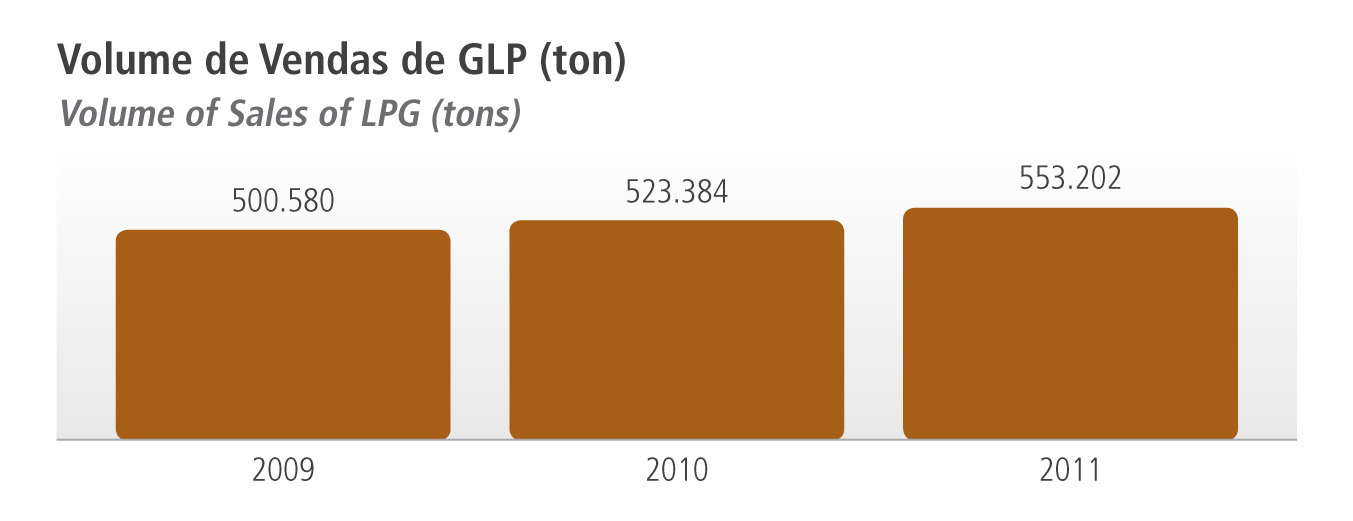
According to the National Agency of Petroleum, Natural Gas and Biofuels (ANP), in 2011 Copa
gaz increased its market share, dominating 7.74% of the LPG distribution segment in Brazil. The company was able to take advantage of the growth in Brazil of gross domestic product (GDP), the expansion of the C class and the increase of its purchasing power, and managed to bring about a 5.7% rise in sales volume over 2010. This figure is above the average of 2.44% for this sector, all of the members of which have reason to celebrate, considering that their figures exceeded the Sindigás forecast for the year of roughly 2.2%.
2011 also registered an expansion of 2.06% in sales of LPG in 13 kg units. For bulk sales, the increase was even more significant: 3.45%. This form of distribution is done through gas plants that use trucks to supply industries, large residential units and commercial establishments. Unfortunately, despite the Petrobrás investment plan, Brazil has not yet achieved self-sufficiency in LPG: in 2011, delays in the company’s business plan, such as the implementation of refineries, required the importation of 26% of the LPG used in the country.
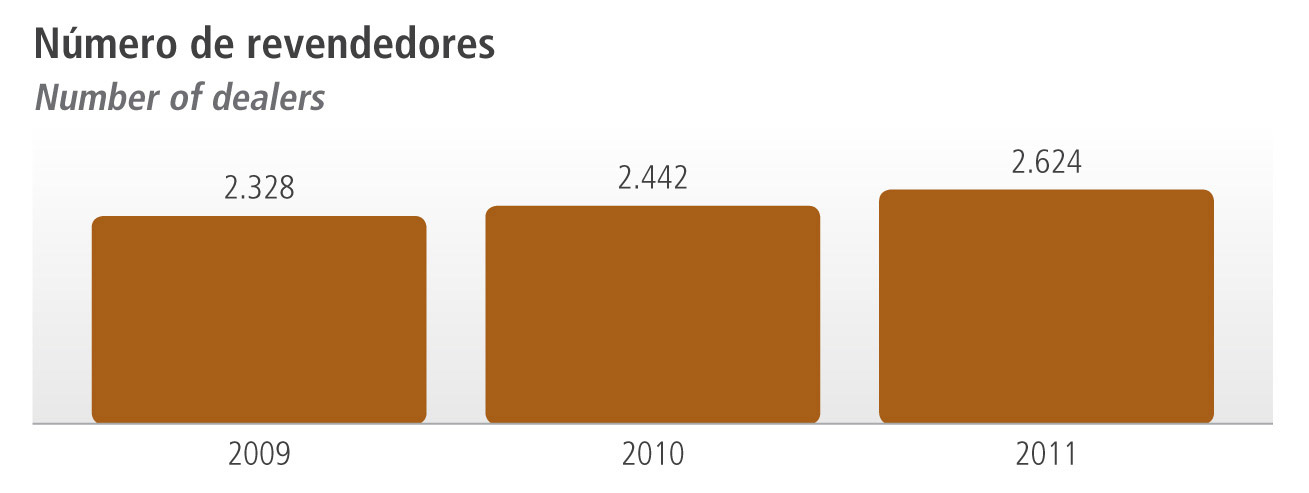
Markets Served
Copagaz serves two large segments of clients: residential and industrial clients. The first is made up of
consumers of gas canisters and cylinders for domestic use, whose supply is ensured by the company’s network of dealers. The second segment, however, is more heterogeneous, being made up of industrial, commercial, rural, and governmental clients, as well as large residential buildings. For this segment, Copagaz supplies LPG through large capacity portable receptacles (20 kg to 190 kg) or stationary receptacles (500 kg to 60 thousand kg).
